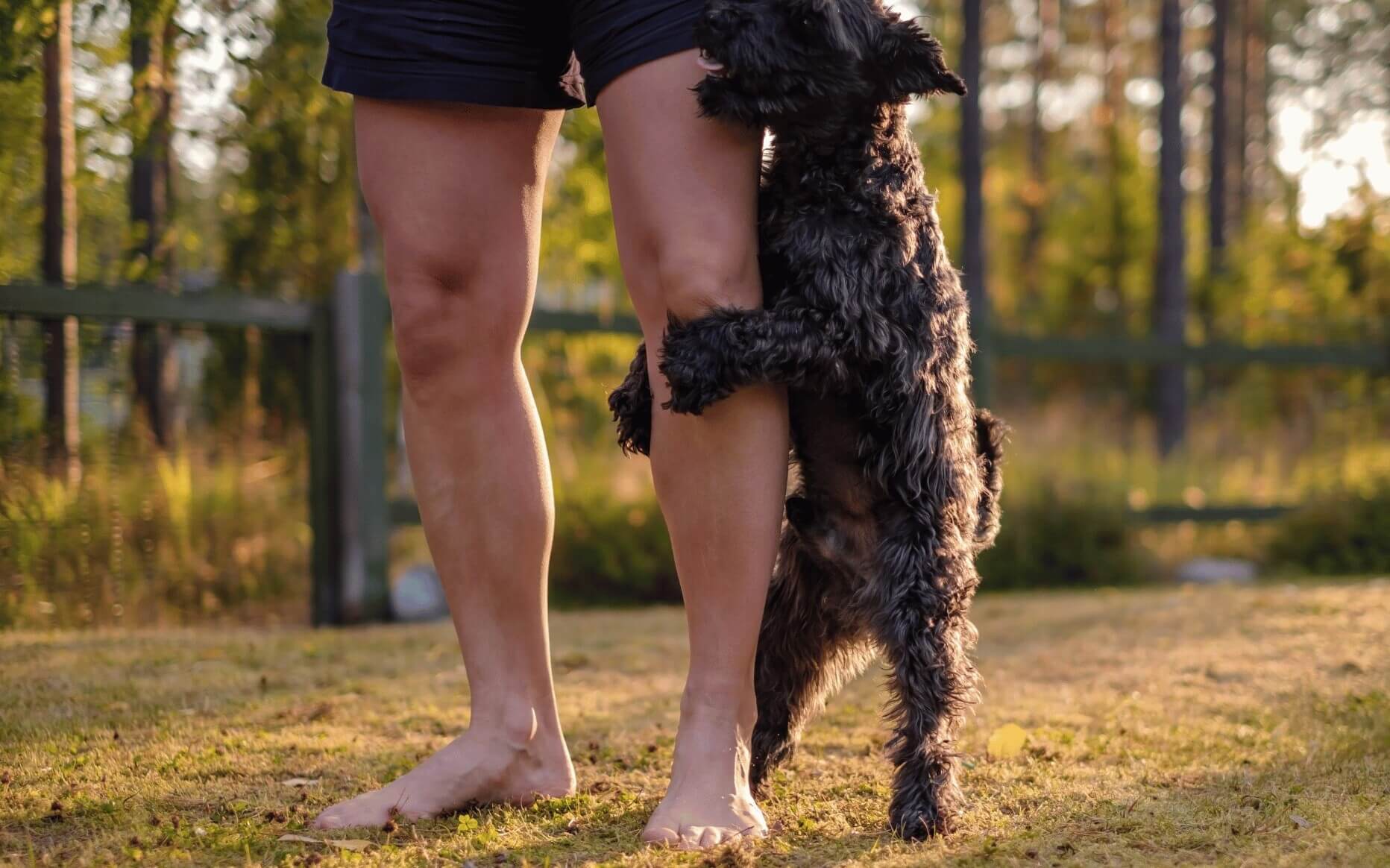If you are wondering, ” why is my dog suddenly distant?” then you may have stumbled on a very pressing matter concerning either your dog’s health, or your relationship with your dog. Dogs are social animals and typically enjoy spending time with their owners, so it can be concerning when they suddenly become distant.
If your dog suddenly starts avoiding you, you can begin by observing your dog’s behavior and try to identify possible triggers. You can also try to create a secure and comfortable environment, like a comfy, calming bed for your dog.
Watching your dog suddenly pull away is difficult, especially if you’ve bonded deeply. However, understanding potential reasons your dog’s ignoring you is the first step to restoring the relationship. To really get into this topic, we’re going to consult Canine Behavior Insights and expert sources with real life examples to explain this behavior.
So, Why is My Dog Suddenly Avoiding Me?
One possible cause of sudden distant behavior in dogs is illness or injury. The illness may be neurological, like cognitive dysfunction, where your dog has difficulty recognizing you. Other possible causes include changes in routine, stress, anxiety, or depression, or break of trust because the owner punished them.
Key Takeaways
- There are several possible causes for sudden distant behavior in dogs, including illness, changes in routine, stress, anxiety, or depression.
- Observing and understanding your dog’s behavior can help you identify possible triggers and create a plan to help your dog.
- If your dog’s behavior does not improve or if you are concerned about their health, it may be time to seek professional help.
Signs of Distant Behavior
- Avoiding eye contact;
- Refusing to come when called;
- Hiding or seeking isolation such as hiding under the bed;
- Licking their lips or yawning excessively;
- Showing signs of aggression or fearfulness;
- Not wanting to be touched;
- Decreased interest in playtime or affection;
- Not seeking you out for activities like walks; and
- Not engaging with you and often not responding when you try to interact.
Now that you know what distant behavior looks like, here are a few possible reasons for the unusual canine behavior.
A Word of Warning About Dog’s Suddenly Acting Distant
Before we get into the many reasons a dog could be acting distant, I want to take a moment to point out that sudden and radical shifts in a dog’s personality and behavior can be a sign of a serious medical issue.
It’s vital to see a vet if your dog is suddenly acting distant and not to assume that it is just a phase. A good example of this pertains to the recent case of a French Bulldog named Ping Ping her owner, Chris. Ping Ping is usually a happy and excitable dog, especially on walks.
After a strange incident one night when she yelped while sleeping, Ping Ping’s behavior shifted radically. She had episodes of “freezing,” and she stopped engaging with her surroundings. It seemed her entire personality had shifted overnight to what could be described as a distant and shut down dog.
Even on a walk, Ping Ping’s favorite activity, she showed no interest in her surroundings or any excitement. A vet visit and an MRI scan revealed that Ping Ping had hydrocephalus, or fluid building up in her brain. This is a serious condition, and it’s vital to catch it early. Had Chris not ensured a veterinary check, the condition could have been much worse.
So if your dog is suddenly acting distant, be sure to check for underlying health conditions first.
9 Reasons Why Your Dog is Acting Sad and Distant
If your dog suddenly becomes distant, it can be concerning and confusing. There are several possible causes for this change in behavior, including health issues, environmental factors, and traumatic events.
Even a dog that was previously cuddly and adored their belly rubs may suddenly withdraw, throwing their owner into a panic. Although it’s possible for your dog to resume their normal behavior, it’s best to understand the triggers and help them in any way you can.
Before you uncover the reasons for your dog’s avoidance, it’s essential to know what distant behavior looks like in dogs. Here are a few signs that your dog is withdrawing into avoidant behavior.
1. Your Dog is Sick or In Pain
Your dog may be sick if they’re distant and exhibiting other symptoms such as limping, lethargy, whining, or changes in appetite. Sickness and pain can also explain why your dog is suddenly distant and not eating.
Our article will help you with ways to comfort your dog in pain. Ultimately, seeking prompt veterinary help is imperative if you suspect your dog is withdrawn because of an illness. Common illnesses affecting your dog’s behavior include arthritis, dysplasia, organ failure, pancreatitis, and injuries.
2. Anxiety and Stress Can Cause Distancing
Fear and anxiety can all cause sudden distant behavior in dogs. You may notice your dog distancing themselves after scary events like loud noises or sudden environmental changes. Some may even try to hide under the bed or in other places where they feel safer.
A study categorized anxiety in dogs into social and non-social (noise, situations, and environments). Your dog can act distant and shake if fear is the reason for their withdrawn behavior.
Ultimately, stress and anxiety cause a flight, fight, or freeze reaction in all animals, including dogs. So anxious dogs may choose to withdraw from situations they feel are overwhelming as part of their natural flight response. When dogs can’t escape, they tend to shut down. This is called “flooding,” and it’s a type of freeze response.
Both shut down dogs and dogs trying to avoid a situation that causes them stress can look like they are suddenly acting distant. It’s common for a dog that recently experienced a dog fight to begin to withdraw from situations where the fight took place or activities that involve the other dog or dogs.
If you have had issues with fighting dogs, see our article on how to discipline dogs after a fight.
3. Neurological Disorders
Some dogs can experience neurological problems that completely change who they are. There are many neurological disorders that can affect how a dogs behaves, including:
- Forebrain dysfunction;
- Hydrocephalus;
- Vestibular syndrome; and
- Encephalitis and many more.
These include cognitive dysfunction (CCD) and dementia and are particularly common in older dogs. Neurological disorders can also cause your dog to act like they don’t recognize you.
This, in turn, makes them suddenly distant because they’re confused about who in the world you are. Sadly, there is no cure once cognitive decline sets in in your pup. However, you can still help your dog with certain aiding medications and mental stimulation.
Signs of CCD ( Canine Cognitive Dysfunction) in dogs include:
- Disorientation;
- Changes in Sleep Patterns;
- Altered Interaction;
- Loss of Housetraining;
- Reduced Problem-Solving Ability;
- Increased Anxiety or Agitation;
- Repetitive Behaviors;
- Decreased Activity Level;
- Changes in Appetite; and
- Loss of Recognition.
4. Broken Trust With Your Dog
Negative experiences, like an owner punishing their dog, can cause a dog to be withdrawn. This is why using positive methods when training your dog is vital.
Remember, punishing and adverse training techniques can cause dogs to avoid you and act distant. If they have negative experiences around you, why would they want to be around you?
This is a crucial point because continued instances of broken trust can either traumatize your dog severely or eventually cause them not to like you.
5. Negative Experiences
A common reason a dog may act distant suddenly is just because they had a negative experience you couldn’t help. This has a lot to do with a dog’s individual personality. A dog like my own rescue mixed breed, Josie, is highly sensitive. This means that in the past, anything she didn’t like could mean that she avoided me for a day or two.
This has been anything from applying medication or spray to repel flies. Once I nicked the quick on her nail when clipping them and was promptly ignored for two days, including refusing to sleep in my bed (her normal spot).
Making time for fun activities after your dog has a negative experience is the best way to replace the negative association with a positive one as quickly as possible.
6. Age-Related Distancing
As dogs age, they may become more withdrawn and less interested in social interactions. This is especially common in senior dogs experiencing age-related health issues like arthritis or organ issues.
Additionally, cognitive decline like dementia and CCD increases as dogs advance in age. This increased risk of cognitive issues can also explain why senior dogs may suddenly distance themselves.
7. Hormonal Changes
Unneutered male or female dogs in heat may become more distant or preoccupied with reproductive instincts, leading to behavioral changes.
Also, medical issues affecting hormones, like hypothyroidism, may cause sudden distant behavior in canines. For instance, Research has shown that hypothyroidism can cause aggression and mental dullness in dogs.
It’s essential to check their hormones if your dog has had a history of hormone-related issues.
8. Lack of Proper Socialization
If your dog has not been adequately socialized, they may struggle with unfamiliar situations or people, leading them to become distant or avoidant. This is most commonly observed in younger dogs but can continue in untrained older dogs.
9. They Can Sense That Something Will Happen to Them
Finally, your dog can withdraw when they sense that their sunset is near. This is particularly common in senior dogs with an age-related physical decline or dogs with terminal health issues.
It’s a difficult subject to think about, but your dog may be acting distant to protect you from the heartbreak they sense is to come. However, other dogs tend to become extra affectionate and cuddly when approaching this time. If this is the case for you, see our article on what to do after a dog has passed on.
What Can I Do to Help My Dog That Is Suddenly Distant?
If you notice that your dog is suddenly distant, there are several things you can do to help them. Here are some suggestions:
Consulting with a Veterinarian
The first step is to consult a veterinarian to rule out any underlying medical issues causing your dog’s behavior changes. Pain, age, appetite, anxiety, stress, and trauma can all contribute to behavioral changes in dogs. A veterinarian can help you identify any health issues affecting your dog’s behavior and recommend appropriate treatment.
Positive Reinforcement Training
Positive reinforcement training can help your dog overcome anxiety, stress, and other behavioral issues. This type of training involves rewarding your dog for good behavior and ignoring or redirecting bad behavior.
It can help your dog feel more confident and secure, reducing their anxiety and stress levels.
Making Changes to Your Dog’s Environment
Changing your dog’s environment can also help reduce their anxiety and stress levels. For example, if your dog is afraid of loud noises, you can create a safe space for them to retreat to during thunderstorms or fireworks displays.
It’s essential to be patient when helping your dog overcome behavioral issues. Changes in behavior may take time and effort to address, but with persistence and positive reinforcement, you can help your dog feel more comfortable and secure.
Exercise Your Dog Both Physically and Mentally
You can also stimulate your dog mentally by giving them puzzle toys or taking them on new and exciting walks. This helps distract them from what’s bothering them and keeps their minds at ease.
When to Seek Professional Help When Your Dog Is Distant
If your dog is suddenly distant, it can be concerning and upsetting. While some behavioral changes are normal, others may indicate an underlying issue that requires professional help. So, when should you seek help from a veterinarian, dog trainer, or behaviorist?
If your dog is limping, lethargic, whining, or has changes in appetite, it’s important to consult with a veterinarian. They can perform a physical exam, run tests, and provide treatment if necessary.
Additionally, a professional can guide you on how to modify your dog’s behavior and help them feel more comfortable and confident. Some even prescribe medication to help those with extreme behavioral challenges.
Frequently Asked Questions (FAQs)
Why is my dog avoiding me?
What does it mean when my dog wants to be alone?
Why doesn’t my dog want to be around me anymore?
Why does my dog keep moving away from me When I Lay Next to Him?
Final Thoughts
Your dog may be acting weird and scared all of a sudden because they’re in pain or have a cognitive issue. Anxiety, stress, and a break of trust after punishment can also cause dogs to act distant abruptly.
Every dog is unique and may require different approaches to address their behavioral issues. If you’re unsure about how to help your dog, consult a veterinarian or a professional dog trainer for guidance.










